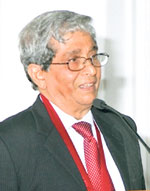The need to widen the tax base rather than increasing tax rates without adverse impacts on the processes of investment and on living conditions of the low and middle income groups in Sri Lanka has been emphasized by Prof. W. D. Lakshman, Chairman of the Presidential Commission on Taxation.
Delivering the annual tax oration of the Faculty of Taxation of the Institute of Chartered Accountants of Sri Lanka (ICASL) on ‘Political Economy of Taxation and Tax Reforms’ in Colombo recently, he said the government is faced with the need to raise revenues from the current level of 14-15 % of GDP to higher levels of above 20 % of GDP that are visible in more developed countries in the world. Whatever the methods adopted in the short run to mobilise the required funds for financing development projects, eventually it is tax revenue buoyancy that is required because tax revenues are needed to repay in future the loans taken today with interest as well as to meet the continually rising new resource needs of the government, he said.

Prof. W. D. Lakshman, Chairman of the Presidential Commission on Taxation |
Prof. Lakshman pointed out that the widened role of the government within the economy produces a tendency for both recurrent and capital expenditures of the government to increase consistently. A widely-felt concern can be seen in government circles about the need to raise government revenues. Taxation is the overwhelmingly dominant component among revenue sources of the government. Buoyancy in tax revenues is therefore critical in the financing of many government-sponsored capital expenditure programmes, as well as many other necessary recurrent expenditure programmes, he said.
He noted that the main theme emerging from a political economy perspective on taxation, including as an essential ingredient an historical view, is that while technical and administrative aspects of tax reform are crucial, an understanding of the sustainability of reforms requires an understanding of how reforms become legitimate and accepted by the people. Because taxation affects incentives and distribution simultaneously, tax reform requires either a degree of social consensus that such policies are in the collective interest and/or it requires a state with the ability to coerce those who challenge its tax reform proposals. The focus on institutional designs and other technical issues of tax would be incomplete if the political nature of taxation is ignored. Of critical importance is the development of bargaining mechanisms between the state and elite groups, who generally control much of the economy’s production activities, he said.
Prof. Lakshman noted that in order to finance the ‘economic war’ the government has turned to certain bilateral country sources for project funding. Certain strategic changes in the country’s international political relations have also been brought about in the process. In addition, funds have been raised from international capital markets by means of sovereign bonds. In this exercise, the relatively large Stand-by Arrangement of the IMF, approved in July 2009, has helped by improving the country’s creditworthiness internationally. In spite of criticisms of the opposition groups and some independent financial analysts, these fund raising practices do not appear to have led to any serious threat to financial stability, because of stronger income or revenue side improvements, it is forecast that the overall balance-of-payments and public finances would improve in the short and medium terms, he said.
Any important change in taxation involves a change in the existing patterns of income distribution, he said adding that taxation is not just a technical issue of defining the tax base, determining the tax rates and setting up tax free allowances. Administation of the tax is important but issues of taxation go beyond this subject and beyond issues of its collectability.
It raises important distributional issues and some social group is bound to be adversely affected in any significant tax reform. It could affect the popularity of political decision makers and could thus influence elections. Tax policy may be viewed as raising issues of ‘class’ conflict. As different income groups are differently affected, the imposition of a new tax or the widening of the coverage of an existing tax is bound to generate opposition from the groups that will suffer income losses and support from those that will benefit from the tax, he added. |


